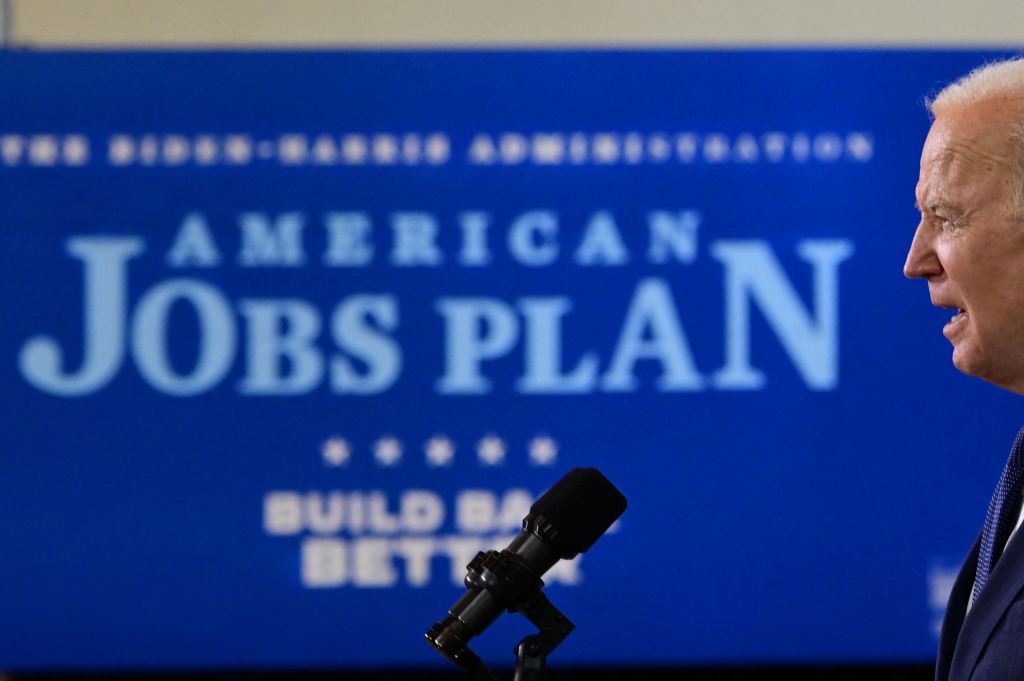What we fight about when we fight about infrastructure


A free daily email with the biggest news stories of the day – and the best features from TheWeek.com
You are now subscribed
Your newsletter sign-up was successful
President Biden unveiled his American Jobs Plan on Wednesday, describing the $2.3 trillion infrastructure initiative as a big, bold, "once-in-a-generation investment in America." Many Republicans immediately opposed the proposal.
"Infrastructure is often described as the ultimate bipartisan policy," but the GOP opposition to Biden's plan is "really just the latest proof that infrastructure has become the ultimate partisan battleground," Michael Grunwald writes at Politico.
"There's widespread support across the political aisle to upgrade the nation's infrastructure," The Washington Post reports. But Republicans, who lowered the corporate tax rate to 21 percent three years ago from 35 percent, oppose Biden's (broadly popular) plan to raise it to 28 percent, and point out he's paying for eight years of infrastructure-adjacent spending with 15 years of those higher corporate taxes. Many progressives want Biden to spend more and question the need to pay for the plan at all, arguing that infrastructure spending more than pays for itself.
The Week
Escape your echo chamber. Get the facts behind the news, plus analysis from multiple perspectives.

Sign up for The Week's Free Newsletters
From our morning news briefing to a weekly Good News Newsletter, get the best of The Week delivered directly to your inbox.
From our morning news briefing to a weekly Good News Newsletter, get the best of The Week delivered directly to your inbox.
But the bigger, irreconcilable difference Biden faces, Grunwald writes, is that "Democrats and Republicans now have very different ideas of what counts as infrastructure, not only because of their very different political philosophies and policy goals, but because they now live in very different places with very different needs." Republicans favor infrastructure like "new highways that connect rural communities and promote exurban sprawl," where GOP voters live, he argues, and they "see most of what Biden proposed as 'Democratic infrastructure,'" targeting "Democratic voters who overwhelmingly live close together in racially diverse cities and transit-friendly inner-ring suburbs."
In that sense, "infrastructure has really become a fight over how Americans will live in the future," Grunwald writes.
Vibrant cities aren't just full of Democrats; vibrant cities create Democrats by drawing newcomers into the urban way of life that seems to make Americans feel more positive about diversity and government and other Democratic values. Similarly, propping up rural areas makes it more likely for rural children to become rural adults who seem much more likely to vote Republican.When Republicans fight the Biden bill, they won't just be fighting investments in blue areas of the country. They'll be fighting to prevent the blue areas of the country from getting ahead, getting more attractive, and converting their kids. [Michael Grunwald, Politico]
Read more of Grunwald's analysis at Politico.
A free daily email with the biggest news stories of the day – and the best features from TheWeek.com
Peter has worked as a news and culture writer and editor at The Week since the site's launch in 2008. He covers politics, world affairs, religion and cultural currents. His journalism career began as a copy editor at a financial newswire and has included editorial positions at The New York Times Magazine, Facts on File, and Oregon State University.
-
 6 exquisite homes with vast acreage
6 exquisite homes with vast acreageFeature Featuring an off-the-grid contemporary home in New Mexico and lakefront farmhouse in Massachusetts
-
 Film reviews: ‘Wuthering Heights,’ ‘Good Luck, Have Fun, Don’t Die,’ and ‘Sirat’
Film reviews: ‘Wuthering Heights,’ ‘Good Luck, Have Fun, Don’t Die,’ and ‘Sirat’Feature An inconvenient love torments a would-be couple, a gonzo time traveler seeks to save humanity from AI, and a father’s desperate search goes deeply sideways
-
 Political cartoons for February 16
Political cartoons for February 16Cartoons Monday’s political cartoons include President's Day, a valentine from the Epstein files, and more
-
 TikTok secures deal to remain in US
TikTok secures deal to remain in USSpeed Read ByteDance will form a US version of the popular video-sharing platform
-
 Unemployment rate ticks up amid fall job losses
Unemployment rate ticks up amid fall job lossesSpeed Read Data released by the Commerce Department indicates ‘one of the weakest American labor markets in years’
-
 US mints final penny after 232-year run
US mints final penny after 232-year runSpeed Read Production of the one-cent coin has ended
-
 Warner Bros. explores sale amid Paramount bids
Warner Bros. explores sale amid Paramount bidsSpeed Read The media giant, home to HBO and DC Studios, has received interest from multiple buying parties
-
 Gold tops $4K per ounce, signaling financial unease
Gold tops $4K per ounce, signaling financial uneaseSpeed Read Investors are worried about President Donald Trump’s trade war
-
 Electronic Arts to go private in record $55B deal
Electronic Arts to go private in record $55B dealspeed read The video game giant is behind ‘The Sims’ and ‘Madden NFL’
-
 New York court tosses Trump's $500M fraud fine
New York court tosses Trump's $500M fraud fineSpeed Read A divided appeals court threw out a hefty penalty against President Trump for fraudulently inflating his wealth
-
 Trump said to seek government stake in Intel
Trump said to seek government stake in IntelSpeed Read The president and Intel CEO Lip-Bu Tan reportedly discussed the proposal at a recent meeting
